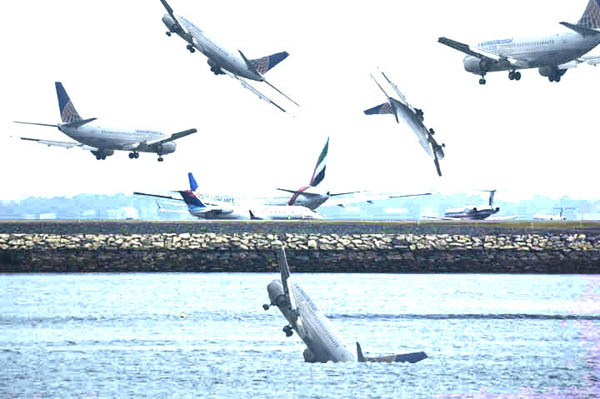Wed 31 Oct 2007
Zero Carbon Britain – (Almost) Zero Carbon Now, Part II
Posted by Adam under UncategorizedNo Comments
A remarkable survival plan – if survival is what we want . . .

While Climate Chronicles indulges in solo prose to warn of the impending Flood, fervently hoping to muster people to address climate reality, the Centre for Alternative Technology (CAT) (1) in the U.K. is building an Ark – for all of us if we have the sense to climb on board. Founded in 1973, CAT is a leading European environmental research and experimental station and community, and has grown from wind turbines hand-made from cloth and old car parts to a state-of-the-art (both low- and high-tech) leading edge planning and development center. I highly recommend visiting CAT’s informative and entertaining website.
In June 2007 CAT issued its ground-breaking report, Zero Carbon Britain (ZCB) (2), which outlines the elements of a plan to reduce greenhouse gas emissions in the U.K. to zero by the year 2027. While I maintain that 2027 is far too late, I readily admit that I am stubbornly insistent on the demands of physical reality – ZCB is tipping its hat to political “reality,” as irrelevant to the natural world though politics may be.
ZCB’s approach is very important because bold political action is necessary to move us forward in survival mode, and I suspect that they themselves realize that their twenty-year timeframe, as radical as it may sound to the globalized mindset, is at the distant periphery of the rational. Others of us will continue to sound the Zero Carbon Now alarms, and perhaps all of us together will make a meaningful dent in the current ill-disguised corporate-driven stupidity that passes for governmental policy and decision-making.

ZCB not only proposes aggressive targets for emissions reductions, but maps out reasonable ways of getting there. It pretty much covers the economic sectors that George Monbiot addressed in his recent well-researched and passionate book, Heat (3), where he sought paths to a 90% reduction in emissions by 2030. I find it interesting that ZCB, published a scant six months or so after Monbiot’s work, had already upped the ante. Fortunately, as the rate of our carbon emissions tragically accelerates, so do attempts to guide us from our addiction.
You can view a short ZCB summary animation here. ZCB takes a broad view of our climate challenges, considering not only greenhouse gas emissions but also the global equity that must be part of the transition, the social and psychological stresses associated with the massive changes required, and related environmental issues, peak oil and economics. You will find discussions of buildings, transport, industry, communications and technology, agriculture and diet, and energy, with a focus on the local and self-sufficient.
Driving the practical aspects of ZCB is a market-based strategy called Tradeable Energy Quotas, or TEQs:
These are allocated free to households and sold through auction to businesses. Each year the cap on TEQs is reduced, so there are fewer to share, in line with the national budget. . . . Gradually, individuals and companies would have to learn to make low and zero-carbon choices, due to the cost or inconvenience of doing otherwise. TEQs are tradable, and represent a source of income for cash poor households. Essentially carbon credits become a kind of parallel currency. (ZCB, p. 14)
While I have serious concerns about market-based strategies, I nonetheless encourage all Climate Chronicles readers to examine the full report. Such nonsense as the Warner-Lieberman “America’s Climate Security Act” currently before Congress represents typical corporate-driven greenwashing, deception and a major giveaway to the very industrial polluters that created the problem. In contrast, ZCB takes a clear look at a much larger picture for our consideration (4).

Next time: With Friends Like These: The Sierra Club Leads Us Off a Cliff.
Copyright 2007 by Adam D. Sacks, all rights reserved.
1. Download the 114-page report here: www.cat.org.uk
2. www.zerocarbonbritain.org
3. George Monbiot, Heat: How to Stop the Planet from Burning, 2007.
4. Brad Knickerbocker, “Critiques of a Climate Bill,” The Christian Science Monitor, October 25, 2007, http://www.truthout.org/issues_06/102507ED.shtml.
Leave a Reply
You must be logged in to post a comment.